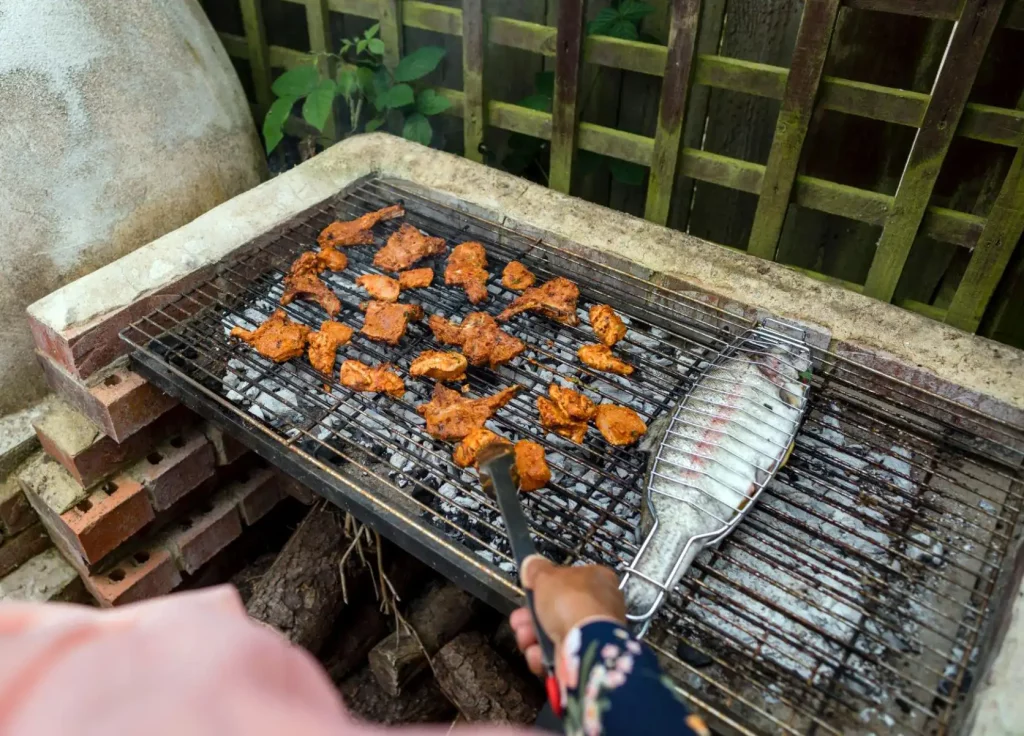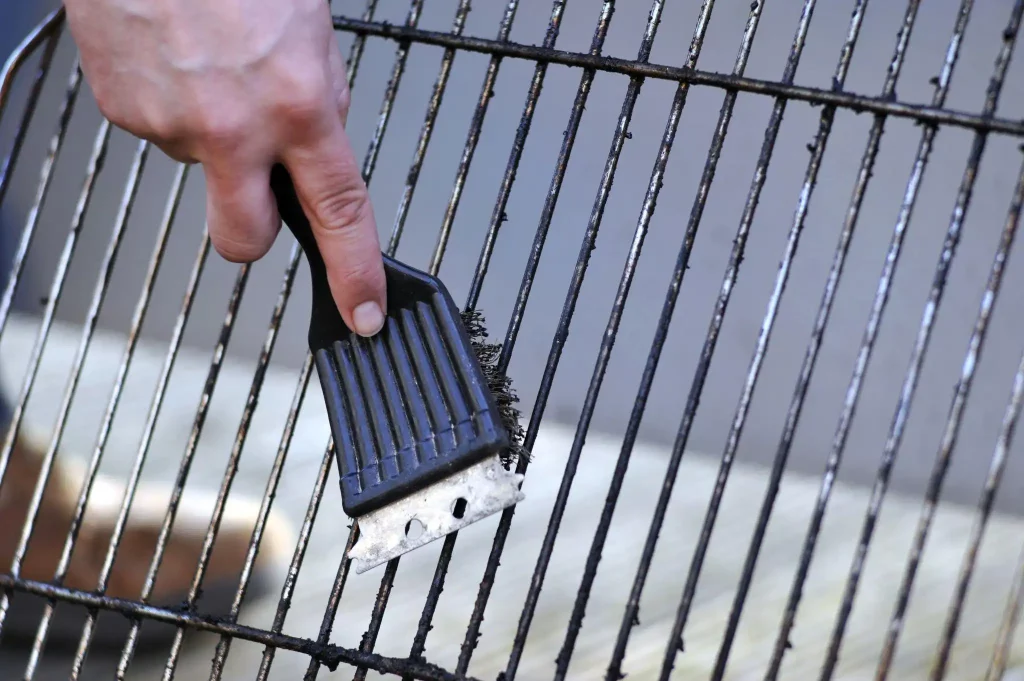Are you scratching your head over how to remove rust from cast iron grill grates? Well, you're not alone.
As an outdoor enthusiast with a love for camping and grilling, and I've been in your shoes before.
In this guide, I'm excited to share a step-by-step process that will make your grill grates rust-free and ready for your next camping adventure.
The purpose of this article?
To empower you to maintain your grill like a pro, and to keep the essence of your campfire cooking intact!
Understanding Rust: Causes and Consequences
Before we dive into the removal techniques, it's crucial to understand what rust is, how it forms on your precious grill grates, and why it's not a welcome guest at your barbeque parties.
How Rust Develops on Cast Iron
Rust on your cast iron grates is an unwelcome guest that just loves to show up uninvited. It all begins when iron reacts with oxygen and moisture—factors your grill is often exposed to, especially if it's stored outdoors. Over time, this leads to the formation of a brittle, reddish-brown compound we all know as rust.

But why does it prefer your grill grates, you ask? Well, cast iron, while incredibly durable and excellent at holding heat, is prone to rust if not cared for correctly. When we heat up the grates, they expand, exposing the iron within to the elements, which accelerates the rusting process.
Why Rust is Harmful for Cast Iron Grill Grates
Now, a rusty grill grate doesn't just look unappetizing; it affects your grilling experience in quite a few ways. First, rust can lead to an uneven cooking surface, compromising your beautiful grill marks. Plus, it can stick to your food, which isn't the flavor you want when biting into your juicy steak. In the long run, rust can erode your grates, making them brittle and susceptible to breakage.
But here's the silver lining: cast iron is tough, and with a bit of effort, you can restore your rusty grates to their former glory. Stick with me as we delve into that in our next section.
Materials and Tools Needed for Rust Removal
Now that we're familiar with our opponent (the rust), it's time to gather our resources. The beauty of rust removal is that it doesn't require fancy, hard-to-find tools. Most of what you need is probably already sitting in your garage or kitchen cupboard. Let's take a look.
List of Household Items
- Wire Brush or Steel Wool: These will be your main weapons against rust. The bristles are hard enough to scrape away rust without damaging the grates.
- Dish Soap: A mild detergent helps in loosening up the rust particles.
- Bucket: You'll need this to create your soap water solution and to soak the grates if needed.
- Vinegar: An excellent, non-toxic rust dissolver. If the rust is stubborn, a vinegar soak can work wonders.
- Rags or Old Towels: For wiping and drying purposes.
- Protective Gloves: Safety first! Some rust removal methods can be tough on the skin, so better safe than sorry.
List of Commercial Rust Removal Products
While household items can be effective, there are commercial rust removers available that are designed to make your task even easier. Always remember to follow the instructions on the product label for the best results. Here are a few examples:
- Naval Jelly: This is a powerful rust dissolver that's quite popular among grillers.
- Bar Keepers Friend: This is a more gentle, non-toxic option that's safe for use on cookware.
- Wire Grill Brush: While similar to a regular wire brush, these are designed specifically for grill grates.
Read more: How to Restore Cast Iron Dutch Oven
Step-by-Step Guide to Remove Rust from Cast Iron Grill Grates
Now that we're all geared up let's jump right into the rust-busting action. Here's your easy-to-follow guide to removing rust from your grill grates.
Step 1: Safety Preparations
Start by putting on your protective gloves and ensure your workspace is well-ventilated. This is especially important if you're using commercial rust removers.
Step 2: Initial Cleaning of the Grate
Rinse the grates with warm water and scrub off any loose rust particles or leftover food bits with a wire brush or steel wool.
Step 3: Applying the Rust Remover
Now, for the homemade solution, create a mixture of equal parts vinegar and water in your bucket and let the grates soak for a few hours. For commercial products, apply as directed on the packaging.
Step 4: Scrubbing Off the Rust
Once the grates have had a good soak, get back in there with your wire brush or steel wool. You should notice the rust coming off much more easily now. Remember to scrub each grid carefully to ensure you're not missing any spots.
Step 5: Final Cleaning and Drying
Rinse off your grates with warm water and dish soap to remove any lingering rust particles or remover residues. Finally, dry the grates thoroughly with your rags or old towels. Keep in mind, leaving them wet could lead to – you guessed it – more rust.
And there you have it! With a little bit of elbow grease and patience, your cast iron grates should be rust-free and ready for your next grilling adventure!
Learn more also: How to Clean a Cast Iron Teapot
How to Season Your Grill Grates Post-Rust Removal
Getting rid of the rust is just the first part of the battle; the next step is to protect your grates from future invasions. That's where seasoning comes into play. If you've ever cooked with cast iron skillets, you'll be familiar with this process. But if not, no worries, we'll get you up to speed.
Why Seasoning is Important After Rust Removal
Cast iron is incredibly durable, but it's also prone to rusting when exposed to moisture. Seasoning creates a protective layer that prevents water from coming into direct contact with the iron, thus reducing the chances of rust formation. This process also provides a non-stick surface, making cooking and cleaning much easier.
Step-by-Step Guide to Seasoning Cast Iron Grill Grates
- Clean the grates: Start with a clean slate. Make sure your grates are dry and free from any rust or food residue.
- Apply oil: Using a cloth or paper towel, apply a thin layer of cooking oil to the grates. Suitable oils include vegetable, canola, or flaxseed oil.
- Heat the grates: Place the grates in a preheated 375°F (190°C) oven, or simply heat up your grill, for about an hour. This allows the oil to bake into the grates, creating that protective layer.
- Cool down: Let the grates cool down completely before using them. This final step is vital as it allows the seasoning layer to harden and become durable.
Know more: How to Season a Charcoal Grill
Prevention: Tips to Keep Your Grill Grates Rust-Free
Like any good strategy, prevention is key. Here's how you can ensure that your victory over rust is a lasting one.
Regular Cleaning and Maintenance
Make it a habit to clean your grill grates after each use. This doesn't have to be a deep clean every time; just brushing off food residues and wiping them down with a damp cloth can make a world of difference.
Proper Storage
If you won't be using your grill for a while, store the grates in a dry, rust-free environment. Covering the grill with a weather-resistant cover can also protect it from the elements.
Regular Seasoning
As mentioned above, seasoning is your ultimate shield against rust. Aim to season your grill grates at least once a month, or more frequently if you grill often.
FAQs about Remove Rust from Cast Iron Grill Grates
How do you restore rusted cast iron grill grates?
Is it OK to grill on rusty grates?
How do you get rust off grill grates fast?
How to remove rust from cast iron grill grates with vinegar?
Conclusion
We've journeyed together through the lands of rust and come out victorious on the other side. You're now equipped with all the knowledge and tips you need to keep your cast iron grill grates rust-free and in prime grilling condition.
So, what's next? Well, it's time to fire up that grill and get those sizzling steaks and crispy veggies going! Remember, regular cleaning and seasoning is the key to keeping rust at bay.
Feeling a sense of accomplishment? I bet you do! Now, go ahead and share your newfound expertise with fellow grill enthusiasts. You've conquered rust; it's your victory story to tell!
And hey, don't be a stranger. Swing by anytime you need more grilling advice or just a friendly chat. Until then, happy grilling!
To know more: Remove Carbon Buildup on Cast Iron Skillets


